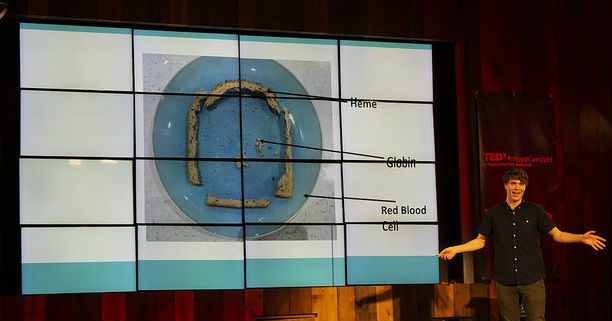Seven things we learned from TEDxCardiffUniversity
26 November 2018The inaugural TEDxCardiffUniversity on The Power of Ideas brought home an all-alumni line-up sharing their thoughts and experiences on a variety of subjects: from nanoscience to the impact of physical environments on our mental health. Here, we look at seven things we learned from TEDxCardiffUniversity to whet your appetite; you can watch videos from the event on YouTube
 1 – “Malaria doesn’t eat the crusts”
1 – “Malaria doesn’t eat the crusts”
Nanoscience can be a pretty unapproachable subject – proper science-y science that’s so tiny you can’t see it happening. Thankfully Josh Davies (MChem 2016) had the perfect visual to explain a key process. Imagine a blood cell is a piece of bread. The crust is the heme, the middle part the globin. Malaria doesn’t eat the crusts! By developing handheld detectors to identify blood cells with only the heme remaining, nanoscience is making diagnosis faster and more portable.
2 – “Pregnancy tests and Roman cups”
One man quote machine Josh also provided our favourite piece of trivia of the day. The same process that turns the line pink on pregnancy tests is used in Roman glass chalice, The Lycurgus Cup. The nanoscience (it’s a gold particle mixed in the glass) is revealed when the cup is lit from behind, changing it from green to red. Gold nanoparticles have a huge range of colours, making them extremely useful for Magneto-Optical Diagnosis.
3 – Period poverty is happening in the 7th richest nation in the world
Fiona Munnelly (BSc 2018) told us about the idea she developed with the group Periods in Poverty: donation points for sanitary products. In a moving talk she outlined the scale of the problem, emphasising that it affects the same groups as those hit hardest by welfare reforms and in-work poverty.
4 – The robots are coming, but you shouldn’t be afraid!
Guto Harri (PgDip 1988) gave an impassioned talk on the opportunities presented by artificial intelligence as it becomes an integral part of our working lives. Rather than something to fear, and with 66 million jobs at risk he understands the impulse, Guto thinks that automating the mundane tasks will allow our human, creative sides to flourish.
5 – Our physical environment has a massive impact on our mental health
Ben Channon (MArch 2012) believes that “we have a responsibility to create buildings that have a positive psychological reaction” on our mental health. He outlined the impact of our physical environment with the results from one Japanese study that found changing the colour of lighting in train stations to blue at night resulted in an 84% decrease in suicides.
6 – Our genetic information is the next big data frontier
Dr Emma Yhnell (BSc 2012, PhD 2016) posed the question “who should know about your unique genetic information?” By talking about her own family members affected by brain disease, and the genetic risks of diseases like Alzheimer’s, Emma challenged the room to think about why, why not, who and how your genetic information should be shared and stored.
7 – Change is ours to grasp
Both Samuel Stainton (MESci 2018) and Rifhat Qureshi (BSc 1999) discussed how the power to change is closer to all of us than we might think. Samuel’s story about how opening up to a stranger changed his life from one of social isolation and loneliness to running for SU president and starting a social enterprise clearly moved the whole room. Rifhat neatly summarised how self-belief can lead us to taking action: “It’s alright if your actions don’t change the world, it’s enough if they change yours.”
It was clear watching all of our speakers, and the stories they brought to the TEDxCardiffUniversity stage, that each of their worlds had been changed by the ideas they discussed. Has our list got you wanting more? You can catch up on each session in full by watching our playlist
- July 2024
- June 2024
- May 2024
- April 2024
- March 2024
- February 2024
- January 2024
- December 2023
- November 2023
- October 2023
- September 2023
- August 2023
- July 2023
- June 2023
- May 2023
- April 2023
- March 2023
- February 2023
- January 2023
- November 2022
- October 2022
- September 2022
- August 2022
- July 2022
- June 2022
- May 2022
- April 2022
- March 2022
- February 2022
- January 2022
- December 2021
- November 2021
- October 2021
- September 2021
- August 2021
- July 2021
- June 2021
- May 2021
- April 2021
- March 2021
- February 2021
- January 2021
- December 2020
- November 2020
- October 2020
- September 2020
- August 2020
- July 2020
- June 2020
- May 2020
- April 2020
- March 2020
- January 2020
- December 2019
- November 2019
- October 2019
- September 2019
- August 2019
- July 2019
- May 2019
- April 2019
- March 2019
- February 2019
- January 2019
- December 2018
- November 2018
- October 2018
- September 2018
- August 2018
- July 2018
- June 2018
- May 2018
- April 2018
- March 2018
- February 2018
- December 2017
- November 2017
- October 2017
- September 2017
- August 2017
- July 2017
- June 2017
- May 2017
- April 2017
- March 2017
- February 2017
- January 2017
- November 2016
- October 2016
- September 2016
- July 2016
- June 2016
- May 2016
- April 2016
- March 2016
- February 2016
- January 2016
- December 2015
- November 2015
- October 2015
- September 2015
- August 2015
- January 2015
- December 2014
- November 2014
- September 2014
- August 2014
- May 2014
